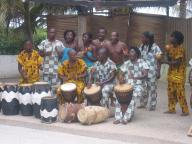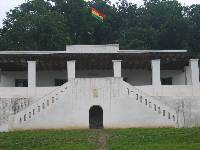Profile
Blog
Photos
Videos
Tuesday 4th August 2009
Today was a day where we stayed at the Kokrobitey site and had lectures. The first dealt with issues of spirituality of the slaves and the second dealt with resistance among enslaved peoples. The spirituality discussion was particularly interesting as although people would think that the enslaves Africans were of traditional and Islamic belief systems, there is evidence confirming that some of the men, women and children who were transported to the Americas were Christian too! This is one of those details that reminds us just how complicated this whole topic is.
When it came to the discussions about resistance, the class (and lecturers) got fired up. There was clearly resistance among the enslaved peoples before they were taken on board and while they were crossing the Atlantic and even while they were on plantations… but it is the nature of resistance that interests. If enslaved peoples managed to break their bonds while making the journey - what then? They were not sailors. They were not navigators. They were not deep sea people who had gone through the sailing revolution that the European nations, Spain, France, Britain and Portugal had gone through in the 14th and 15th Centuries. And this is where the dilemma lay for them. This does not mean that they would not ATTEMPT to battle their captors and sometimes succeed though.
Most interesting though, as Professor Jim Walvin pointed out, was how do thirteen or fourteen overseers maintain the discipline among 300 slaves on a plantation in the Caribbean? They have made the journey, been sold and shipped to various locations and now, are slogging away on a plantation, brutal, back-breaking work. Although we debated the issue for a while - it was almost as if we were somewhat shy to discuss the nature of the methods used by overseers to maintain the status quo. Violence is the simple answer. ("Pornographic violence" is a phrase Professor Walvin used.) Unimaginable things were done - publicly - to ensure that the oppressed did not entertain for long ideas about overthrowing their 'masters'. Of course, there were violent insurrections, especially where the work was unbelievably hard; the plantations of Jamaica, Haiti, Saint Domingue, but not on the scale you would imagine.
Analogies drawn during the discussion included the ways in which the oppressors maintained discipline in Iran, Tiannemen Square and the list goes on and on. I'll leave you with a paragraph from a science fiction novel I am reading at the moment.
From 'The Algebraist' by Iain M. Banks
Setting: Fassin Taak is being tortured by an officer for taking part in a protest. The officer was Taak to sign a declaration saying his friends are involved in subversive activities and deserve death.
The little man looked at him for a moment. 'Mr. Taak,' he said. 'You are not stupid. You must know how societies work. They work on force, power and coercion. People don't behave themselves because they are nice. That's the liberal fallacy. People behave themselves because if they don't they'll be punished. All this is known, it isn't even debatable. Civilisation after civilisation, society after society, species after species, all show the same pattern. Society is control: control is reward and punishment.'
Even though this story relates to futuristic humans and aliens and typical sci-fi stuff - it is still pertinent to what we are focussing on. If you imagine this situation worsened in a slavery context, it can work as the beginning of a description of how enslaved persons were (are) ruled and abused and used.
D
- comments










